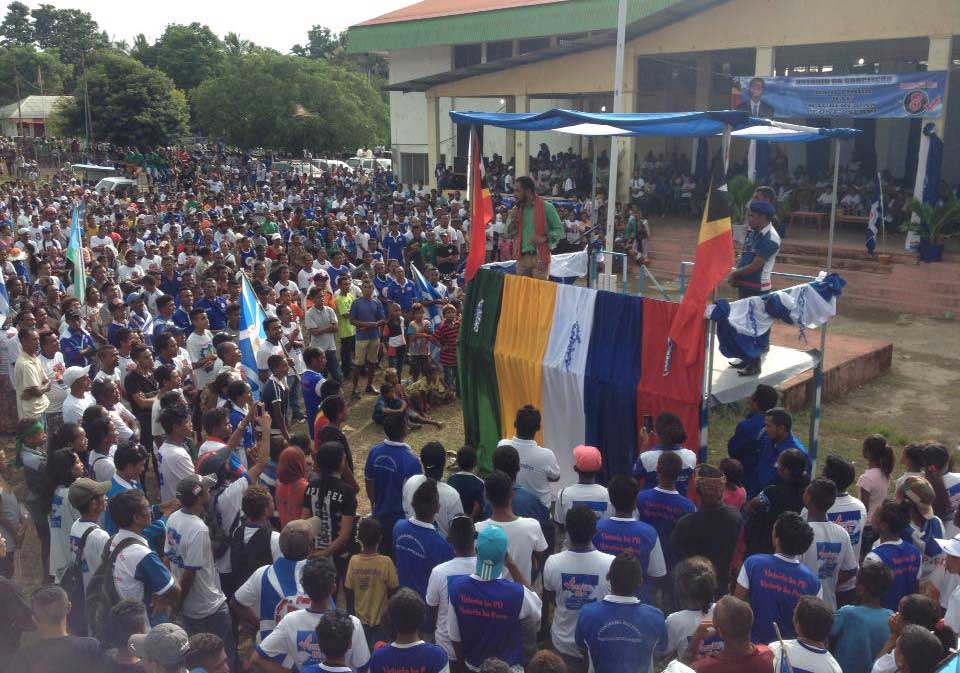InAsia
Insights and Analysis
Timor-Leste Parliamentary Election: Resistance Credentials Likely to Dominate
June 28, 2017
On July 22, Timorese will once again cast their vote in the country’s fourth parliamentary election since independence from Indonesia in 1999. With the March presidential election now almost a distant memory, all eyes are on the hotly contested parliamentary election. It is interesting to note that despite all the news and controversy surrounding the three front-runner parties, more than 20 parties are registering to contest the election.

A campaign rally ahead of presidential elections in Timor-Leste on March 20. Photo/Robby Nocho
With former political rivals and revered resistance parties FRETELIN and CNRT locked in a consensus of convenience, it remains to be seen how the coalition government will pan out, with much depending on the ability of newcomer party, Partido Libertasaun Popular (PLP), to make any inroads in challenging the popularity of the two stalwarts.
Yet, despite 15 years of independence under its belt, and the country’s advances in administration and governance, this election is likely to be driven by loyalties and personal charisma rather than issues or a candidates’ proven track record in public service or concrete plans for the country’s future.
The Asia Foundation’s most recent national public opinion poll reaffirms this projection. While over half of all respondents (54%) claim they voted based on “issues” in 2012, compared with ties to a particular party/candidate, an even larger proportion of voters (58%) indicated the main reason to vote for a particular candidate in the upcoming election is their role in the country’s independence movement, compared with only eight percent who cited “previous leadership experience” and seven percent who indicated the “education/qualifications of a candidate.” When it comes to why people would vote for a particular party, a similar trend emerges: while half said they will vote for that party based on its role in the independence movement, only 22 percent will do so based on the party’s own stated programs and proposals.
Which is all to say that the election should prove interesting for newly emerging political parties who, by definition, did not play a role in the independence movement, and whose leadership is less reminiscent of the traditional political elite in Timor-Leste’s history. The Foundation’s poll reveals a growing discontent among Timorese, in particular among those younger than 25 years of age (voting age is 17). As a result, there could very well be room for at least a minor political shift. Consequently, established parties would be wise to pay attention to youth sentiment surrounding their country: only 50 percent of respondents under 25 said they felt the country is going in the right direction, compared with 80 percent in 2014. Similarly, the proportion of young people who said they thought the country was going in the wrong direction has more than doubled from 17 percent in 2014 to 41 percent in 2016. This type of data matters, as it points to the need to be more responsive and find alternative ways to appeal to the younger electorate, who hold access to employment, education, and other opportunities in far higher regard than historical loyalties linked to their parents and grandparents’ generations.
One major factor in several recent elections elsewhere in the world has been the role of media, especially social media. Here in Timor-Leste, however, despite a rapid internet penetration rate, with 300,000 active Facebook users, and despite an uptick in recent social media exchanges, the traditional modes of accessing information in the society will limit the impact of news on the eventual outcome of the election. Timor-Leste still lacks a robust information culture on both the supply and demand sides of data and evidence generation and consumption. With low levels of education and subsequent high illiteracy, Timor-Leste does not boast a strong reading culture. This is bookended by a weak supply of thought-provoking analysis on the part of the media, which struggles with effective investigation, critique, and accurate reporting skills.
Consequently, much of the election results will be driven by the ongoing rallies and the ability of vying personalities to enchant voters to either stick with them or change their views to support them – rather than driven by the hard facts of programs, policies, and plans for addressing the many concerns cited in the survey, such as service delivery, lagging infrastructure, and corruption.
While the country may witness a crack in a very strongly cemented system in this election, the beliefs and habits of old are more likely to prevail over any major shift away from the established parties’ proud resistance credentials. Nevertheless, even a minor political shift away from the status quo could potentially lead to significant changes in future elections.
Editor’s note: This version has been edited slightly from the original.
The 2016 Tatoli! Pubic Opinion Poll is this fifth installment of the Australian Government-funded national opinion poll.
Susan Marx is The Asia Foundation’s country representative in Timor-Leste. The views and opinions expressed here are those of the individual author and not those of The Asia Foundation or its funders.
About our blog, InAsia
InAsia is posted and distributed every other Wednesday evening, Pacific Time. If you have any questions, please send an email to [email protected].
Contact
For questions about InAsia, or for our cross-post and re-use policy, please send an email to [email protected].The Asia Foundation
465 California St., 9th Floor
San Francisco, CA 94104
The Latest Across Asia
Program Snapshot
April 18, 2024
News
April 17, 2024

2024 Lotus Leadership Awards
Thursday, April 25, 2024, New York City
The Lotus Leadership Awards recognize contributions towards gender equality in Asia and the Pacific







0 Comments